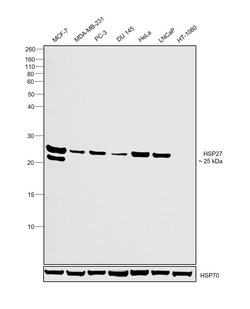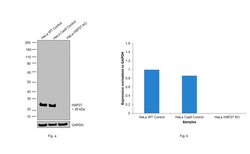Learn More
Invitrogen™ HSP27 Monoclonal Antibody (G3.1)
Mouse Monoclonal Antibody
Supplier: Invitrogen™ MA3015
Description
MA3-015 detects heat shock protein 27 kDa (HSP27) from human, rat, mouse, monkey, and canine samples. MA3-015 has been successfully used in Western blot, immunohistochemistry (paraffin), immunoprecipitation, immunofluorescence, immunocytochemistry and ELISA procedures. By Western blot, this antibody detects an ~24 kDa protein representing HSP27 in MCF-7 cell extract. Immunohistochemical staining of human cervix with MA3-015 results in intense cytoplasmic staining of the epithelium within the parabasal cell layer. Western blot detection of HSP27 in canine heart samples is weak and may require optimization. The MA3-015 antigen is partially purified HSP27 derived from MCF-7 cytosol. The mouse HSP27 sequence is strongly conserved within the human sequence, so cross-reactivity with mouse HSP27 is expected. Antibodies to this protein (and modification) were previously sold as part of a Thermo Scientific Cellomics High Content Screening Kit. This replacement antibody is now recommended for researchers who need an antibody for high content cell based assays. It has been thoroughly tested and validated for cellular immunofluorescence (IF) applications. Further optimization including the selection of the most appropriate fluorescent Dylight conjugated secondary antibody may have to be performed for your high content assay.
In response to adverse changes in their environment, cells from many organisms increase the expression of a class of proteins referred to as heat shock or stress proteins. HSPB1 (heat shock protein beta-1 or HSP27) is a small heat shock protein which functions as a molecular chaperone that maintains denatured proteins in a folding-competent state. It plays a role in stress resistance and actin organization. Through its molecular chaperone activity, HSP27 regulates numerous biological processes including the phosphorylation and the axonal transport of neurofilament proteins. Mutations in the gene can result in Charcot-Marie-Tooth disease 2F and Neuronopathy distal hereditary motor 2B.
Specifications
| HSP27 | |
| Monoclonal | |
| Conc. Not Determined | |
| Ascites with 0.05% sodium azide | |
| P04792, P42929, P42930 | |
| HSPB1 | |
| Partially purified human HSP27. | |
| RUO | |
| 24471, 3315, 403979 | |
| -20°C, Avoid Freeze/Thaw Cycles | |
| Liquid |
| ELISA, Immunohistochemistry (Paraffin), Immunomicroscopy, Immunoprecipitation, Western Blot, Immunocytochemistry | |
| G3.1 | |
| Unconjugated | |
| HSPB1 | |
| 27kDa; 28 kDa heat shock protein; CMT2F; DKFZp586P1322; epididymis secretory protein Li 102; estrogen-regulated 24 kDa protein; Growth-related 25 kDa protein; heat shock 25 kDa protein; Heat shock 27 kDa protein; heat shock 27kD protein 1; heat shock 27kDa protein 1; Heat shock protein; heat shock protein 1; heat shock protein 27 kDa beta-1; heat shock protein B1; heat shock protein beta-1; heat shock protein family B (small) member 1; heat shock protein, 25 kDa; heat-shock protein; HEL-S-102; HMN2B; HS; HS.76067; HSP; HSP 25; HSP 27; Hsp25; HSP27; HSP28; HSPB1; p25; Phospho-HSP 27; SRP27; Stress-responsive protein 27; truncated hsp25 | |
| Mouse | |
| 100 μL | |
| Primary | |
| Human, Rat, Canine, Monkey | |
| Antibody | |
| IgG1 |
Safety and Handling
Your input is important to us. Please complete this form to provide feedback related to the content on this product.












